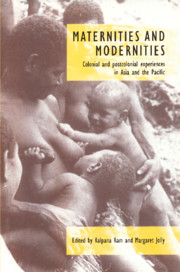Book contents
- Frontmatter
- Contents
- List of illustrations
- Notes on contributor
- Acknowledgements
- Map 1 Location of countries and regions in Asia and the Pacific discussed in this volume
- Introduction Colonial and postcolonial plots in histories of maternities and modernities
- 1 Shaping reproduction: maternity in early twentieth-century Malaya
- 2 Modernizing the Malay mother
- 3 ‘Good wives and mothers’ or ‘dedicated workers’? Contradictions of domesticity in the ‘mission of sisterhood’, Travancore, south India
- 4 Maternity and the story of enlightenment in the colonies: Tamil coastal women, south India
- 5 The dai and the doctor: discourses on women's reproductive health in rural Bangladesh
- 6 Other mothers: maternal ‘insouciance’ and the depopulation debate in Fiji and Vanuatu, 1890–1930
- 7 Just add water: remaking women through childbirth, Anganen, Southern Highlands, Papua New Guinea
- 8 From sisters to wives: changing contexts of maternity on Simbo, Western Solomon Islands
- Epilogue Maternal experience and feminist body politics: Asian and Pacific perspectives
- Index
Epilogue Maternal experience and feminist body politics: Asian and Pacific perspectives
Published online by Cambridge University Press: 06 July 2010
- Frontmatter
- Contents
- List of illustrations
- Notes on contributor
- Acknowledgements
- Map 1 Location of countries and regions in Asia and the Pacific discussed in this volume
- Introduction Colonial and postcolonial plots in histories of maternities and modernities
- 1 Shaping reproduction: maternity in early twentieth-century Malaya
- 2 Modernizing the Malay mother
- 3 ‘Good wives and mothers’ or ‘dedicated workers’? Contradictions of domesticity in the ‘mission of sisterhood’, Travancore, south India
- 4 Maternity and the story of enlightenment in the colonies: Tamil coastal women, south India
- 5 The dai and the doctor: discourses on women's reproductive health in rural Bangladesh
- 6 Other mothers: maternal ‘insouciance’ and the depopulation debate in Fiji and Vanuatu, 1890–1930
- 7 Just add water: remaking women through childbirth, Anganen, Southern Highlands, Papua New Guinea
- 8 From sisters to wives: changing contexts of maternity on Simbo, Western Solomon Islands
- Epilogue Maternal experience and feminist body politics: Asian and Pacific perspectives
- Index
Summary
The chapters in this volume stand heir to more than one genealogy in the way in which they approach the conceptualization of maternal embodiment. The first genealogy links the volume to anthropological conceptualizations of the relations between culture and bodily experience. This epilogue opens with reflections on anthropological traditions, presenting them not only as internally diverse and contested, but as a tradition capable of being recast into new forms of life. The second genealogy links the volume to controversies within feminism regarding the most appropriate ways in which to understand the construction of the female body within and through relations of power.
The two genealogies are not commensurate. Feminist theory has grown out of a fundamental ethical and political impulse rather than out of any notion of a ‘pure’ pursuit of knowledge, and withers where divorced from those impulses. Anthropology, for all the necessary departures of its practitioners from the halls of Western academia for life in very different cultures, and for all the internal complexities of anthropology as cultural critique, remains firmly located within the power/knowledge nexus of academic discourse.
Anthropology and feminism are also not commensurate in respect of the part they play in shaping this epilogue. Without attempting to do justice to all the anthropological questions raised by this volume, I will endeavour to characterize the debates over just two key terms which are central to the anthropology of maternity: the body, and culture. Taking advantage of the prerogative of the epilogue writer to revisit the concerns of a volume, I have chosen to elaborate and in some ways recontextualize just one concern, albeit a central concern of the volume.
- Type
- Chapter
- Information
- Maternities and ModernitiesColonial and Postcolonial Experiences in Asia and the Pacific, pp. 275 - 298Publisher: Cambridge University PressPrint publication year: 1998
- 14
- Cited by



